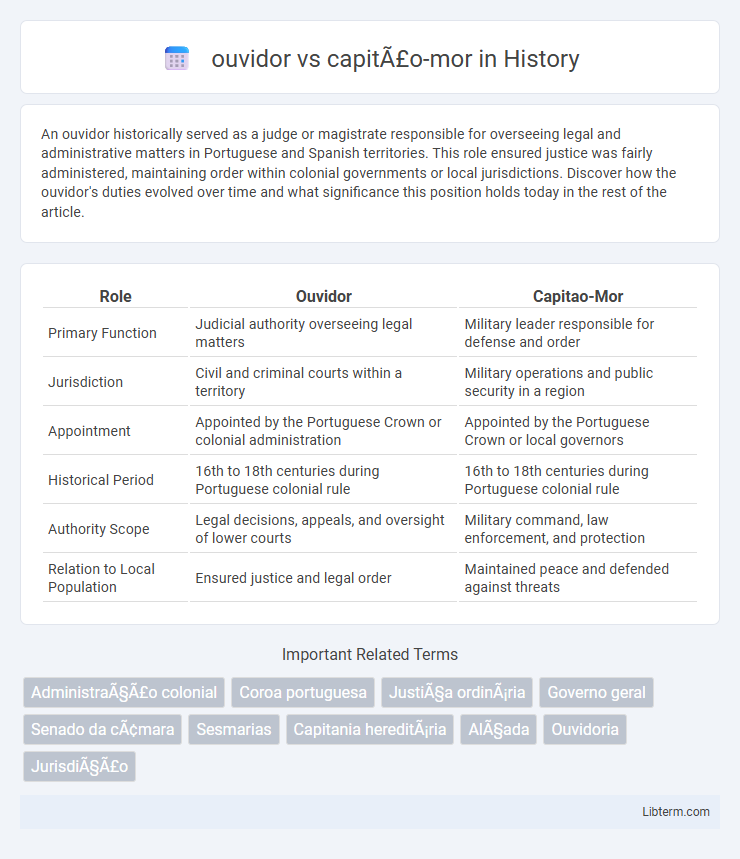An ouvidor historically served as a judge or magistrate responsible for overseeing legal and administrative matters in Portuguese and Spanish territories. This role ensured justice was fairly administered, maintaining order within colonial governments or local jurisdictions. Discover how the ouvidor's duties evolved over time and what significance this position holds today in the rest of the article.
Table of Comparison
| Role | Ouvidor | Capitao-Mor |
|---|---|---|
| Primary Function | Judicial authority overseeing legal matters | Military leader responsible for defense and order |
| Jurisdiction | Civil and criminal courts within a territory | Military operations and public security in a region |
| Appointment | Appointed by the Portuguese Crown or colonial administration | Appointed by the Portuguese Crown or local governors |
| Historical Period | 16th to 18th centuries during Portuguese colonial rule | 16th to 18th centuries during Portuguese colonial rule |
| Authority Scope | Legal decisions, appeals, and oversight of lower courts | Military command, law enforcement, and protection |
| Relation to Local Population | Ensured justice and legal order | Maintained peace and defended against threats |
Introdução: Funções Administrativas no Brasil Colonial
The Ouvidor and Capitao-Mor held distinct administrative roles in colonial Brazil, with the Ouvidor primarily responsible for judicial oversight and municipal governance, whereas the Capitao-Mor focused on military defense and territorial control. The Ouvidor acted as a magistrate ensuring legal order and regulating local disputes, while the Capitao-Mor commanded armed forces to protect settlements from indigenous attacks and foreign invasions. These positions were critical for maintaining colonial administration, combining civil jurisdiction with military authority to consolidate Portuguese rule.
Origem Histórica do Ouvidor
The Ouvidor, originating in 16th-century Portuguese colonial administration, served as a judicial and administrative official overseeing municipalities and towns, contrasting with the Capitao-Mor who primarily held military command and local defense responsibilities. The Ouvidor's role evolved from the Crown's need to centralize judicial authority and ensure the application of royal laws in overseas territories, acting as a mediator between settlers and indigenous populations. While the Capitao-Mor maintained order through military means, the Ouvidor emphasized legal oversight and governance, reflecting the institutional differentiation within colonial governance structures.
Capitão-mor: Surgimento e Papel Inicial
The Capitao-mor emerged in the 16th century as a crucial military and administrative authority in Portuguese colonial territories, tasked primarily with defense and maintaining order. Initially, the Capitao-mor held command over local militias and was responsible for implementing royal directives, often acting as the king's representative in frontier regions. This role was pivotal in securing colonial settlements against external threats and coordinating local governance alongside other officials like the Ouvidor.
Responsabilidades e Atribuições do Ouvidor
O Ouvidor era responsavel pela supervisao da justica e administracao publica nas capitanias durante o periodo colonial, atuando como juiz e fiscalizador das acoes do Capitao-Mor. Enquanto o Capitao-Mor detinha o comando militar e a administracao administrativa, o Ouvidor concentrava-se na aplicacao das leis, resolucao de conflitos e protecao dos direitos dos colonos e indigenas. Suas atribuicoes incluiam julgar causas civis e criminais, garantir a ordem juridica e reportar irregularidades as autoridades superiores.
Funções Militares e Administrativas do Capitão-mor
The Capitao-mor exercised both military and administrative functions, commanding local militias, overseeing defense strategies, and maintaining public order in colonial settlements. This role included managing territorial boundaries, supervising resource distribution, and implementing royal policies to ensure effective governance. In contrast, the Ouvidor primarily functioned as a judicial officer, focusing on legal and administrative oversight rather than direct military responsibilities.
Estrutura Hierárquica: Ouvidor vs Capitão-mor
The ouvidor functioned as the chief judicial authority in colonial administration, overseeing legal and administrative matters with the power to hear appeals and ensure compliance with royal decrees. The capitao-mor held military and policing authority, responsible for local defense, maintaining public order, and commanding armed forces in their jurisdiction. While the ouvidor's role was judicial and administrative, the capitao-mor exercised executive and military control, creating a clear hierarchical distinction between legal oversight and armed governance in the colonial structure.
Relação com a Coroa Portuguesa
The ouvidor functioned as a judicial and administrative officer directly accountable to the Portuguese Crown, ensuring the enforcement of royal laws and fiscal policies in the colonies. The capitao-mor held military command and local governance duties but often operated with more autonomy, especially in frontier areas, sometimes leading to conflicts with the central authority. The Crown relied heavily on the ouvidor to maintain legal order and reinforce its sovereignty, while the capitao-mor's role was more oriented toward defense and territorial expansion.
Impacto das Decisões do Ouvidor na Sociedade Colonial
The Ouvidor held significant judicial authority in colonial society, directly influencing social order through decisions that impacted legal disputes, land rights, and commerce regulation. Unlike the Capitao-Mor, whose primary role was military and administrative, the Ouvidor's rulings shaped colonial governance by promoting justice and addressing conflicts among settlers and indigenous populations. These judicial decisions reinforced social hierarchies and contributed to the stability and economic development of colonial communities.
Capitão-mor e a Defesa do Território
Capitao-mor held primary military authority responsible for the defense and security of colonial territories, organizing local militias and fortifications to protect against external threats and indigenous uprisings. The role was crucial in maintaining territorial control, overseeing strategic planning and executing military operations to safeguard settlement boundaries. Unlike the ouvidor, who focused on judicial and administrative matters, the capitao-mor ensured the physical defense and stability of the region.
Diferenças e Similaridades: Ouvidor e Capitão-mor
The ouvidor functioned primarily as a judicial and administrative magistrate responsible for legal oversight and dispute resolution in colonial settlements, while the capitao-mor held military command and governance duties, including defense and public order. Both positions were crucial in maintaining colonial authority but differed in scope: the ouvidor emphasized civil administration and justice, whereas the capitao-mor focused on military leadership and territorial control. Despite their distinct roles, both officials often collaborated to ensure effective governance and stability within the captaincy system.
ouvidor Infographic

 libterm.com
libterm.com